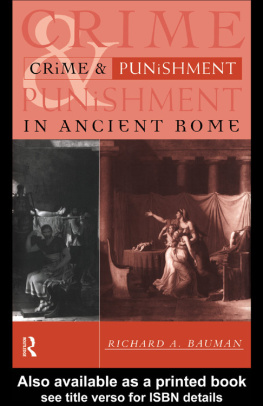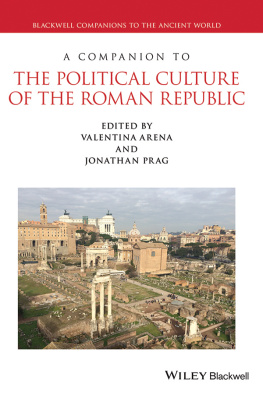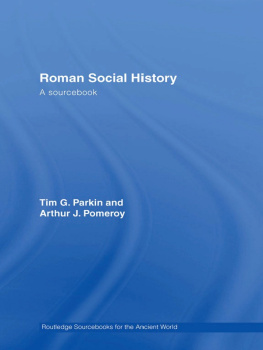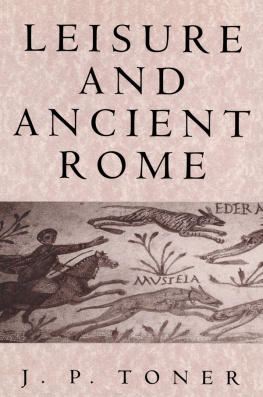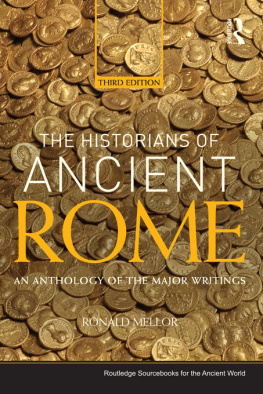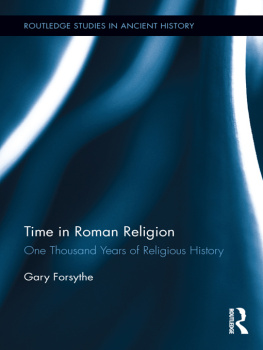
CRIME AND PUNISHMENT IN
ANCIENT ROME
CRIME AND
PUNISHMENT IN
ANCIENT ROME
Richard A.Bauman
London and New York
For Sheila and Nicola
First published 1996
by Routledge
11 New Fetter Lane, London EC4P 4EE
This edition published in the Taylor & Francis e-Library, 2004.
Simultaneously published in the USA and Canada by Routledge
29 West 35th Street, New York, NY 10001
1996 Richard A.Bauman
All rights reserved. No part of this book may be reprinted or reproduced or utilized in any form or by an electronic, mechanical, or other means, now known or hereafter invented, including photocopying and recording, or in any information storage or retrieval system, without permission in writing from the publishers.
British Library Cataloguing in Publication Data A catalogue record for this book is available from the British Library Library of Congress Cataloging in Publication Data Bauman, Richard A.
Crime and punishment in ancient Rome/Richard A.Bauman.
p.
cm.
Includes bibliographical references and index.
1. Punishment (Roman law) 2. Criminal law (Roman law)
Philosophy. I. Title.
KJA3612.B38
1996
345.009376dc20
[342.509376] 9621587
CIP
ISBN 0-203-42858-7 Master e-book ISBN
ISBN 0-203-73682-6 (Adobe eReader Format)
ISBN 0-415-11375-X (Print Edition)
CONTENTS
Preface
List of Abbreviations
1 INTRODUCTION
Crime and Punishment
Punishment: The Greek Experience
Roman Punishment in Theory and Practice
Criminal Courts and Punishments
Humanitas, Saevitia and Punishment
2 TRIAL BY MAGISTRATE AND PEOPLE
The Early Poena Legis
The Iudicium Populi: Procedure and Penalties
Punitive Assessments by Tribunes
Punitive Assessments by Aediles
Humanitas and Punishment: Voluntary Exile
The Limits of Voluntary Exile
Humanitas and Capital Punishment
Conclusion
3 TRIAL BY JURY
The Decline of the Iudicia Populi
The Quaestiones Perpetuae
Verdict and Sentence in the Quaestiones Perpetuae
Humanitas: The Alternative Capital Penalty
Sub-Capital Penalties
Mixed Penalties: Parricidium
Mixed Penalties: Adulterium
Conclusion
CONTENTS
4 CICERO ON PUNISHMENT
Cicero and Pragmatic Conceptualization
Cicero in Theoretical Mode
Humanitas and Utilitas Publica
Cicero in 63: The Background
The Trial of Rabirius
The Conspiracy of Catiline
Cicero in 63: The Aftermath
Conclusion
5 THE NEW COURTS: AUGUSTUS AND TIBERIUS
The Cognitio Extraordinaria
Augustus and Punishment: The Senate
Augustus and Punishment: The Emperors Three Hats
The Senatorial Court under Tiberius
All The Laws In Good Shape Except One
Conclusion
6 THE MATURING COGNITIO: CALIGULA AND
CLAUDIUS
Consolidation of the Emperors Court
Caligula: Punishment and Precedent
Black Comedy and Punishment
Caligula and Arbitrary Cognitio
Claudius, Parricidium and Humanitas
Claudius: Other Uses of Humanitas/Aequitas
The Pumpkinification of Claudius
Conclusion
7 NERO AND THE STOICS
The Two Faces of Stoicism
Seneca on Clemency
Nero and Clemency: The Pedanius Case
Nero and Clemency: Insults to the Emperor
Nero and Clemency: The Deflection of Odium
Utilitas Publica and Entertainment
Nero after Seneca
Public Opinion and the Death of Octavia
Conclusion
8 DOMITIAN AND MORALITY
Introduction
Domitian and the Vestals
vi
CONTENTS
Clemency and the Deflection of Odium
Conclusion
9 PREFECTS AND CRIMINAL TRIALS
Introduction
The Urban Prefect in Neros Reign
The Urban Prefect from Vitellius to Domitian
The Urban Prefect in the Second Century
The Praetorian Prefect: Condemnations by Acclamation
The Praetorian Prefect: Conditional Adjudication
The Primacy of the Lex Fabia
The Praetorian Prefect: Unconditional Adjudication
Conclusion
10 THE GROWTH OF CRIMINAL JURISPRUDENCE:
DE IUDICIIS PUBLICIS
The Foothills of Punitive Theory
The De Iudiciis Publicis Genre
Motivation and Ideology
Conclusion
11 THE GROWTH OF CRIMINAL JURISPRUDENCE:
DE POENIS
The De Poenis Genre
Differential Punishments: Terminology
Differential Punishments: Cut-Off Points and Status Symbols
The Lower Cut-Off Point: Humiliores and Slaves
Extra Ordinem Penalties: Discretionary or Mandatory?
Conclusion
12 ATTITUDES TO PUNISHMENT
Introduction
The Republic and Early Principate
The Second Century: The Great Debates
The Attitudes of the Severan Jurists
Your Interpretation Is Alien To My School of Thought
Cruel Punishments Were Threatened But Never Used
Conclusion
13 IN RETROSPECT
Notes
Select bibliography
Index to sources
General index
vii
PREFACE
Roman Criminal Law has attracted steady attention ever since Mommsen gave it form and definition nearly a hundred years ago. Of the many scholars who have clarified and amplified Mommsens ideas, a special place is occupied by Kunkel. Other important contributors include, in chronological order, Greenidge, Strachan-Davidson, Girard, Rogers, Siber, Vittinghoff, Brasiello, Brecht, Avonzo, Bleicken, Waldstein, Genin, Eder, Cloud, Ungern-Sternberg, Gioffredi, Wieacker, A.H.M.Jones, Pugliese, H.Jones. The writers contributions appear in the Bibliography.
The above works can all be classified, to a greater or lesser extent, as general surveys. The present study does not aim to produce another such survey. Our focus is a more specialized one. We are concerned primarily with punishment, over the period of the Republic and the Principate; substantive law and procedure fill a subsidiary, though still important, role. Mommsen made some valuable observations on punishment, as did Kunkel, but no special lens was trained on the topic until Levys seminal study of capital punishment which appeared in 1931 and was included in the collected edition of his works in 1963.
Duponts investigation of Constantines criminal law is marginal to our period but instructive, and so is Biondis work on the law of the Christian emperors as a whole. Within our period Levy was followed by the several studies of De Robertis and Cardascia, and Garnseys full-length study in 1970 which is the only major work in English.
(Drapkin focuses only in partand inadequatelyon classical antiquity.) Since 1970 there has been something of a minor proliferation. The works of Fanizza, Ducos, Rilinger and Cantarella call for special mention, as do the symposia edited by Thomas and by Diliberto. There are also the shorter studies by Andr, Archi, Brunt, Cornell, Crif, Eisenhut, Ferrary, Flach, Fraschetti, Garofalo, Grelle, PREFACE
Grodzynski, Lassen, Liebs, Marino, Monaco, Mouchova, Richardson, Robinson, Spruit, Thome, Volterra and Wolf.
Next page
